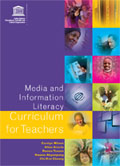UNESCO supports First International Forum on Media and Information Literacy
15-06-2011 (Fez)

Cover page of the Curricula
© UNESCO
UNESCO has partnered with the Sidi Mohamed Ben Abdellah University (Morocco), the Islamic Education, Scientific and Cultural Organisation (ISESCO), the Arab Bureau of Education for the Golf States (ABEGS) and the United Nations Alliance of Civilizations (UNAOC) and other partners to organize the First International Forum on Media and Information Literacy (MIL) from 15 to 17 June 2011 in Fez, Morocco.
This Forum is the first of its kind at the international level to examine media and information literacy as a combined set of competencies (knowledge, skills and attitudes). Issues relating to importance of media, Internet and information providers and their impact on learning, cultures and public opinion, the empowering effect of MIL practices and global Internet governance will be among the main discussions at the Forum. Over 200 participants representing all regions of the world are expected to participate.
UNESCO believes the convergence of broadcast and telecommunication technologies, driven by the digital age, requires that information literacy and media literacy be considered together. Therefore media literacy + information literacy = media and information literacy.
This approach harmonises these two formerly distinct and converging fields and in so doing enhances MIL as powerful tool to allow citizens to participate in the governance of their countries and the international media and information networks, to promote intercultural dialogue and facilitate lifelong learning. On this basis, UNESCO took the lead in blending the two concepts and now promotes MIL as an engaging civic education movement through the preparation of the Media and Information Literacy Curriculum for Teachers. The Curriculum will officially be launched at the Forum in Fez.
In order to adapt the Curriculum to the needs and specificities of the Arab Region, UNESCO and its partners are also organizing the Regional Consultations on the MIL Curriculum for Teachers for the Arab States, within the framework of the Forum. To encourage research on MIL, UNESCO and UNAOC will launch the International University Network on Media and Information Literacy and Intercultural Dialogue. The Fez Declaration on MIL and the Plan of Action to promote MIL and encourage international, regional and inter-regional cooperation to this effect, are expected outcomes of the Forum.
The preparation of this MIL Curriculum for Teachers and the setting up of the MIL University Network represent two components of a comprehensive strategy to foster media and information literate societies. Other actions include the facilitation of international cooperation, preparation of a Global Framework on MIL Indicators, development of Guidelines for Preparing National MIL Policies and Strategies, and establishment of an International Clearinghouse on MIL in cooperation with the United Nations Alliance of Civilizations.
UNESCO believes the convergence of broadcast and telecommunication technologies, driven by the digital age, requires that information literacy and media literacy be considered together. Therefore media literacy + information literacy = media and information literacy.
This approach harmonises these two formerly distinct and converging fields and in so doing enhances MIL as powerful tool to allow citizens to participate in the governance of their countries and the international media and information networks, to promote intercultural dialogue and facilitate lifelong learning. On this basis, UNESCO took the lead in blending the two concepts and now promotes MIL as an engaging civic education movement through the preparation of the Media and Information Literacy Curriculum for Teachers. The Curriculum will officially be launched at the Forum in Fez.
In order to adapt the Curriculum to the needs and specificities of the Arab Region, UNESCO and its partners are also organizing the Regional Consultations on the MIL Curriculum for Teachers for the Arab States, within the framework of the Forum. To encourage research on MIL, UNESCO and UNAOC will launch the International University Network on Media and Information Literacy and Intercultural Dialogue. The Fez Declaration on MIL and the Plan of Action to promote MIL and encourage international, regional and inter-regional cooperation to this effect, are expected outcomes of the Forum.
The preparation of this MIL Curriculum for Teachers and the setting up of the MIL University Network represent two components of a comprehensive strategy to foster media and information literate societies. Other actions include the facilitation of international cooperation, preparation of a Global Framework on MIL Indicators, development of Guidelines for Preparing National MIL Policies and Strategies, and establishment of an International Clearinghouse on MIL in cooperation with the United Nations Alliance of Civilizations.
Related themes/countries
· Morocco
· Media and Information Literacy
Share this story:
Contact information
-
Contact
- Alton Grizzle, UNESCO, Division of Freedom of Expression and Media Development
- Misako Ito, UNESCO Office in Rabat
- George Awad, UNESCO Office in Beirut
- UNESCO
Source














